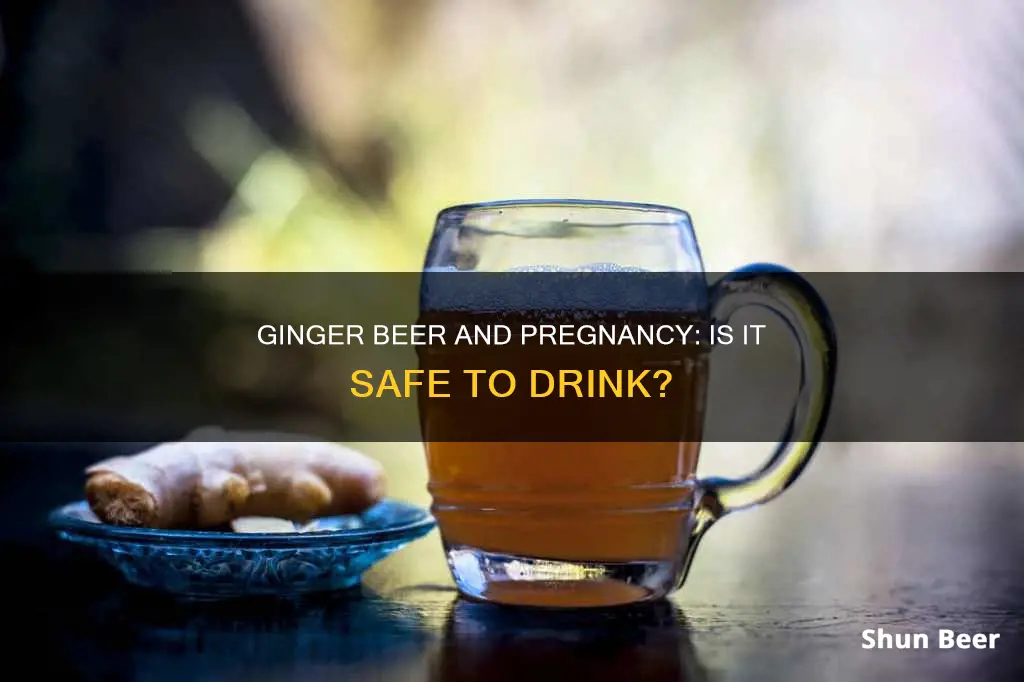
Pregnancy is a time when women have to be careful about what they consume. Alcoholic drinks are a no-go, but what about non-alcoholic drinks like ginger beer? While non-alcoholic drinks are generally considered safe, there is limited research on their effects during pregnancy. Some non-alcoholic drinks can contain up to 0.5% alcohol, and there is a chance they may contain higher ethanol levels than indicated on the label. As there is no known safe level of alcohol intake during pregnancy, the safest option is to abstain from such drinks. However, some sources recommend non-alcoholic ginger beer as a tasty and healthy alternative to alcoholic drinks during pregnancy, as ginger is perfect for fighting morning sickness and nausea.
What You'll Learn

Is ginger beer safe for morning sickness?
Pregnancy can be a challenging time, and morning sickness is a common issue that many expectant mothers face. While there are various remedies and recommendations, one question that often arises is whether ginger beer is a safe and effective option for alleviating these symptoms. Here's what you need to know about consuming ginger beer during pregnancy:
Ginger's Benefits for Morning Sickness
Ginger has long been recognized as a natural remedy for nausea and vomiting, making it a popular choice for pregnant women experiencing morning sickness. The root contains compounds that help calm an upset stomach and can provide relief from nausea and vomiting. This makes ginger beer, with its sharp and spicy flavour, an appealing option for those seeking a tasty way to ease their discomfort.
Non-Alcoholic Ginger Beer: A Better Option
When considering ginger beer during pregnancy, it's essential to opt for the non-alcoholic variety. While alcoholic drinks are generally not recommended during pregnancy, non-alcoholic ginger beer can be a refreshing and helpful addition to your arsenal against morning sickness. It provides the benefits of ginger without the concerns associated with alcohol consumption during this delicate time.
Safety Considerations
However, it's important to note that not all non-alcoholic drinks are created equal. Some beverages labelled as "non-alcoholic" may still contain up to 0.5% alcohol by volume. This small amount of alcohol may not seem significant, but it's crucial to remember that there is no known safe level of alcohol intake during pregnancy. To completely eliminate any potential risks to your developing baby, it's advisable to choose drinks labelled as "alcohol-free" instead, as these are required by law to contain no traceable alcohol.
Exploring Other Options
If you're unsure about ginger beer or want to explore other options, there are plenty of alternative ways to incorporate ginger into your routine. Fresh ginger tea, for instance, can be a soothing and effective remedy for morning sickness. You can also try adding ginger to your meals or snacking on ginger candies specifically designed for pregnancy. These alternatives provide the same nausea-fighting properties as ginger beer without the carbonation, which may be unappealing to some.
In conclusion, while ginger beer can be a tasty and refreshing way to combat morning sickness, it's important to prioritize your and your baby's safety. Opting for non-alcoholic or alcohol-free ginger beer is the best choice, as it provides the benefits of ginger without the risks associated with alcohol. Remember to read labels carefully and consult with your healthcare provider if you have any concerns or questions about what is suitable for you during your pregnancy journey.
Beer and Running: What's the Deal?
You may want to see also

What are the risks of drinking alcohol during pregnancy?
Ginger beer is a tasty and healthy alternative to drinking alcohol while pregnant. It's an excellent option for combating morning sickness and nausea. However, it's important to note that even drinks labelled "non-alcoholic" can contain up to 0.5% alcohol, and there is limited research on the effects of such drinks during pregnancy.
Drinking alcohol during pregnancy can have serious adverse effects on the developing foetus. Alcohol crosses the placenta via the umbilical cord, and the foetus's blood alcohol level can reach that of the mother within about two hours. As the foetus's metabolism is slower, alcohol remains in its system for longer. This extended exposure to alcohol can cause a range of issues, collectively referred to as Fetal Alcohol Spectrum Disorders (FASD).
FASD can lead to physical abnormalities, including abnormal facial characteristics, small head circumference, and below-average height and weight. It can also cause problems with eyesight or hearing, and issues with bones, heart, and kidneys.
Additionally, FASD can result in behavioural and learning difficulties, as well as emotional and social skill development issues, hyperactivity, and problems with communication, such as speech.
Drinking alcohol during pregnancy also increases the risk of miscarriage, premature birth, and low birth weight.
The risks associated with alcohol consumption during pregnancy are dose-dependent, meaning the more you drink, the greater the risk to the baby. Therefore, it is recommended that pregnant individuals or those trying to conceive abstain from alcohol completely until after giving birth.
Beer Left Out: Still Safe to Drink?
You may want to see also

What are the best non-alcoholic alternatives to drink?
Drinking ginger beer can be a great way to fight morning sickness and nausea during pregnancy. However, it's important to note that even drinks labelled "non-alcoholic" can contain up to 0.5% alcohol, and there is limited research on the effects of such drinks during pregnancy. Therefore, it's always best to choose drinks that are labelled "alcohol-free", which by law must contain no traceable alcohol.
Mocktails
Mocktails are a fantastic way to enjoy a sophisticated drink without the alcohol. You can make your own at home or ask a bartender to create something special for you. Here are some mocktail ideas:
- Alcohol-Free Mimosa: Combine orange juice with sparkling cider.
- Alcohol-Free Lemon Lavender Martini: Combine lemon juice with lavender simple syrup, shake with ice, and top with Sprite.
- Alcohol-Free Peach Bellini: Blend frozen peaches, sparkling apple cider, and simple syrup.
- Moscow Mule Mocktail: Combine simple syrup, lime juice, ginger puree, and top with ginger ale.
- Classic Bloody Mary Mocktail.
- Blackberry Lemon Mocktail.
Non-Alcoholic Drinks
There are plenty of non-alcoholic drinks to choose from that are perfect for when you're expecting. Some ideas include:
- Sparkling white grape juice with fruit puree.
- Pomegranate juice with sparkling water.
- Cranberry juice with a splash of pineapple juice or soda water.
- Lemonade with a splash of soda water.
- Half cranberry juice and half ginger ale, or ginger beer.
- Half Sprite and half orange juice.
- Non-alcoholic ginger beer with apple juice or lemonade.
Remember, it's always a good idea to check with your healthcare provider if you have any concerns about what is safe to consume during pregnancy.
The Magic of Beer Thieves: How Do They Work?
You may want to see also

What are the risks of drinking non-alcoholic beer during pregnancy?
Drinking non-alcoholic beer during pregnancy is a personal choice, but it's important to be aware of the potential risks involved. While non-alcoholic drinks are generally considered safe, there are a few things to keep in mind when it comes to pregnancy.
Firstly, it's important to understand that the term "non-alcoholic" doesn't necessarily mean alcohol-free. In many countries, beverages labelled as non-alcoholic can legally contain up to 0.5% alcohol by volume (ABV). This means that even though the amount of alcohol is very small, it is still present. According to the American College of Obstetrics and Gynecology (ACOG), there is no safe amount of alcohol during pregnancy, as it is linked to behavioural and learning difficulties, birth defects, and fetal alcohol spectrum disorder (FASD). Therefore, it is recommended to avoid any drinks that contain alcohol, including those labelled as non-alcoholic.
Secondly, labels on non-alcoholic drinks may not always be accurate. Studies have shown that some beverages labelled as non-alcoholic or alcohol-free actually contain higher levels of alcohol than indicated. For example, a 2010 study found that 29% of the drinks they tested had ethanol levels higher than declared on their labels, and some even had up to 1.8% ABV. This discrepancy could be due to variations in production methods or labelling regulations across different countries. Consuming drinks with higher levels of alcohol than expected can obviously pose risks to the developing fetus, especially if consumed in large quantities.
Additionally, some non-alcoholic drinks may contain other ingredients that are not recommended during pregnancy. Certain herbs, extracts, or additives may be present in these beverages, and their safety for pregnant women has not been fully established. Always read the labels carefully and consult with your healthcare provider if you are unsure about a particular ingredient.
Lastly, while the effects of non-alcoholic drinks on the fetus are relatively unknown, it is important to consider the potential impact on breastfed infants. Research has shown that ethanol can be detected in breast milk after consuming non-alcoholic beer, although the levels are generally considered harmless to the infant. However, to be on the safe side, it is recommended to briefly delay breastfeeding after consuming non-alcoholic drinks or express and discard breast milk to avoid any potential exposure to alcohol.
In conclusion, while non-alcoholic beer may seem like a harmless choice during pregnancy, it is important to be aware of the potential risks. The best approach is to always read labels carefully, consult with your healthcare provider, and make informed choices that prioritize the health and safety of you and your baby.
Beer and Pregnancy: First Trimester Drinking Concerns
You may want to see also

What are the risks of drinking alcohol while breastfeeding?
While there is limited research on the effects of consuming alcohol while breastfeeding, it is generally advised to limit alcohol intake to one drink per day. Alcohol can cause several issues for infants, including drowsiness, deep sleep, weakness, abnormal weight gain, and decreased milk intake. It can also impair the mother's milk ejection reflex.
Research has shown that nursing infants consume less milk in the three-to-four-hour period after their mothers have consumed a small to moderate amount of alcohol. One study showed that infants consumed 20-23% less milk after their mothers drank alcohol. Alcohol has also been linked to sleep disturbances in infants, including shorter sleep periods, more frequent wakefulness, and less total active and REM sleep.
In addition, alcohol consumption while breastfeeding may lead to impaired immune function, delayed motor development, and potential impairment of cognitive development in the infant. It is important to note that newborns and young infants metabolize alcohol at a slower rate than adults, so it is recommended to avoid drinking alcohol until the baby is at least eight weeks old.
To minimize the concentration of alcohol in breast milk, it is advised to breastfeed two hours or longer after consuming alcohol. Pumping and dumping are not necessary, as alcohol leaves the breast milk as it leaves the bloodstream. However, if you feel uncomfortably full, it is recommended to pump or hand express to avoid plugged ducts and mastitis.
Beer and Tamiflu: Is It Safe to Drink?
You may want to see also
Frequently asked questions
Non-alcoholic ginger beer is generally considered safe to consume during pregnancy. However, it is important to check the label, as some beverages labelled "non-alcoholic" can contain up to 0.5% alcohol.
There are many non-alcoholic drink options during pregnancy, including mocktails, alcohol-free cocktails, non-alcoholic beer, and herbal tea.
Yes, ginger is known to be effective in combating morning sickness and nausea, which are common during pregnancy.







